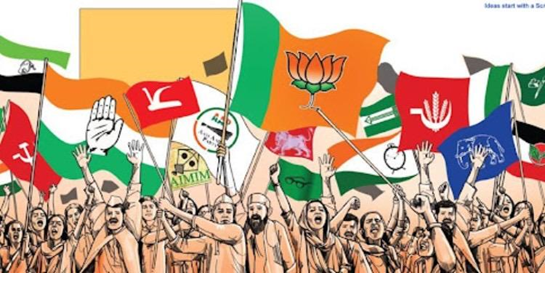National Party Status
Context: The Election Commission recently recognised the Aam Aadmi Party (AAP) as a national party, while revoking that status of the All India Trinamool Congress, Nationalist Congress Party (NCP) and the Communist Party of India (CPI).
The Commission also revoked the state party status granted to RLD in Uttar Pradesh, BRS in Andhra Pradesh, PDA in Manipur, PMK in Puducherry, RSP in West Bengal and MPC in Mizoram.
What is a national party?
- The name suggests that a national party would be one that has a presence ‘nationally’, as opposed to a regional party whose presence is restricted to only a particular state or region.
- National parties are usually India’s bigger parties, such as the Congress and BJP. However, some smaller parties are also recognised as national parties.
- A certain stature is sometimes associated with being a national party, but this does not necessarily translate into having a lot of national political clout.
- Some parties, despite being dominant in a major state — such as the DMK in Tamil Nadu, BJD in Odisha, YSRCP in Andhra Pradesh, RJD in Bihar, or TRS in Telangana — and having a major say in national affairs, remain regional parties.
- If a party is granted national status, it is entitled to certain privileges and perks, such as reserved party symbols, and the party’s candidates get more airtime on television, and radio during elections.
How is a national party defined?
- The ECI has laid down the technical criterion for a party to be recognised as a national party. A party may gain or lose national party status from time to time, depending on the fulfilment of these laid-down conditions.
- As per the ECI’s Political Parties and Election Symbols, 2019 handbook, a political party would be considered a national party if:
- it is ‘recognised’ in four or more states; or
- if its candidates polled at least 6% of total valid votes in any four or more states in the last Lok Sabha or Assembly elections and has at least four MPs in the last Lok Sabha polls; or
- if it has won at least 2% of the total seats in the Lok Sabha from not less than three states
- To be recognised as a state party, a party needs:
- at least 6% vote-share in the last Assembly election and have at least 2 MLAs; or have 6% vote-share in the last Lok Sabha elections from that state and at least one MP from that state; or
- at least 3% of the total number of seats or three seats, whichever is more, in the last Assembly elections; or
- at least one MP for every 25 members or any fraction allotted to the state in the Lok Sabha; or
- have at least 8% of the total valid votes in the last Assembly election or Lok Sabha election from the state.
Practice Question
|




